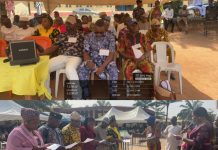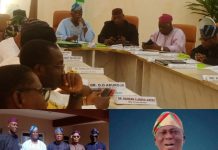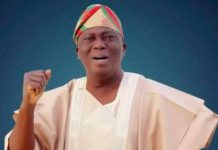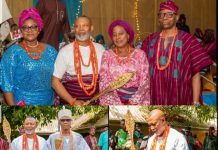
By Busuyi Mekusi.
Costumes are a style of dress, which includes garments, accessories, hairstyle, etc., that is characteristic of a particular people in a specific historical period of human existence. In this regard, costumes reflect class, gender, race, profession, ethnicity, nationality, etc. Whereas costumes could be the type of dress used for a specific occasion, they are also worn by actors, as they are clothes one wears when dressing up like another person. Based on the foregoing enunciations, we are all costumed at one time or another, and for many reasons whatsoever.
More importantly, in artistic imitation and representation, costumes afford literature the opportunity to achieve verisimilitude on stage by investing an actor, standing in the place of a character, with the emotions, characteristics and ambience envisaged in the personality conceived and created by the author. To this end, as captured in the notation of Super Story, the character is a pencil in the hands of the creator, just as we are in the hands of God.
The announcement of the death of the veteran Yoruba film actor, Ojo Arowosafe, popularly known with the stage name, Fadeyi Oloro, struck a chord about the yawning gap between the mortality of human personalities and the immortality in artistic characters. The timelessness of arts confers automatic existence on the characters therein. Okonkwo in Achebe’s Things Fall Apart is still alive in the text and the possibilities of same in other living beings, just as the economic man in Defoe’s Robinson Crusoe is reincarnated in capitalist individuals even up to the 21st century. This is not to mention the materially greedy Soyinka’s Elesin found in postmodern world of consumerism, as satirised in Death and the King’s Horseman , or the manipulative cheating personality of Anansewa in Sutherland’s The Marriage of Anansewa .
Fadeyi Oloro, the Igbara-Odo born artist dominated the theatre space in the 80s and 90s for his uniquely trademarked herbalist and antagonist character in a Yoruba TV series titled ‘Arelu’, scripted by a notable artist, Jimoh Aliu. Fadeyi Oloro was reputed for his oratory skills in Yoruba incantation, laced with a wild imposing figure that his characteristically costumed outfits offered as well. Apart from the black painting that constructed in him the ‘darkness’ that is associated with horror and evil, the various accoutrements such as animal horn, clothed in red cloths, cowries, broken mirrors, etc., that reinforced his characterisation, were things associated in traditional Yoruba societies to mysticism and supernaturalism. He would accentuate his dreadful escapades with the word: Sùkè, to typify the totality of his bestiality.
Little wonder that the transmogrified personality of horror and terror created in and through Fadeyi Oloro achieved the awe, dread, and trepidation in viewers of those times, most especially children whose sense of believability was profound. Fadeyi Oloro similarly became a metaphor for brute, touchiness and emotional volatility at this period. As indicative of costuming, the creation and popularity of Oloro cohered with the metaphysical predilection of the time. The blackness used in costuming in theatres today both deliberately and inadvertently underscores the motif in Joseph Conrad’s Heart of Darkness .
Artistic costuming smacks of personality alteration and fraud, as it allows for pretension or better than the unattainable idea of the ideal that Plato frowned at in his “Republic”, as he saw artists as liars. The double-face allows by costumes speaks to the character traits of so many Nigerians who have the proclivity for prevaricating and dissembling. Notwithstanding the Biblical notion of the truth making someone free, as conscience remains an open wound only healable by truth, most of those who proclaim Christianity are held down by half-truths, and nurtured in lies. Truth is not only scarce in religious places but it has been made unpopular that whoever stays with it stands alone. Just like other values, truth is now an anathema while falsehood, like other vices, is celebrated and rewarded. The few ones that avoid unnecessary costumes that would make them what they are not are rejected, abhorred and scandalised as part of the selfish negotiation for opportunities and socio-political relevance.
Nigerians revolt against reality and truth has led to mystification and transmogrification in all facets of life. Religious leaders sustain the oppression and exploitation of their unwary followers, just as politicians exploit electorate due to economic disempowerment and all-round disillusionments. Owing to the costume that allows people to easily mask their real combustive selves, presenting instead a false idealistic personality that is considered acceptable to the society; human relationships are challenged across the different divides.
For instance, oaths made by public servants are largely not kept; marital vows entered into by temporarily sanctimonious but realistically salacious individuals are violated at will, with disorientation taking over on all sides. Emotional disorders are now common! Contrary to the relief attainable in religion, most religious places have been reduced to desecrated spaces, with forced submission, subjugation and weaponisation of rebellion going hand-in-hand. The Nigerian society has receded as criminality enjoys beautification as a result of what many redundantly considered being a revolt against hegemony.
Two discussions I had with two different individuals same day recently underpinned the perception of Nigerians about the need to be consciously selective in behaviour, pretentious in mannerism and deceptive through deliberate moderation of one’s opinion, in what they considered was imperative for enjoying patronage from leaders that were believed to be antithetical to truthfulness, transparency and factual details. One of the discussants had recommended the need to thread softly, and get rid of what he claimed some people considered to be youthful exuberance. Yours truly was not miffed by these misconception and abrasion, but was overwhelmed by the continuous popularity of costuming in repressing the truth and emplacing falsehood, in order to join others to stoop to conquer.
Two contemporary important public servants that have rejected borrowed robes in their public engagements in recent times are Arakunrin Akeredolu, the governor of Ondo State, and the President-Elect, Bola Tinubu. While the former was so vociferous about true federalism and power shift to the south, even against his own political survival, the latter had two major public verbal diatribes with President Muhammadu Buhari and some elements in the Aso Rock at different times before the APC presidential primary and general elections. The taunting of PMB by Tinubu, in relation to the roles he played to convert Buhari’s failed aspirations to a win and the fact that it was his turn (Emilokan) to be president pointedly destabilised every opposition to his aspiration, through the deployment of a performative force in public discourse. As part of the build-up to the national elections, Tinubu equally lampooned individuals within the presidency that he felt were working against his victory at the polls through the cash-swap and fuel crises.
The two personages above roundly succeeded in their notable ventures and political engagements, robed in the costumes they are personally noted for, and not those that would make them pretentiously look like somebody else. Considering the sacrifice that Ojo Arowosafe made to be reconfigured as Fadeyi Oloro, not minding the negating portraits of this role on his actual personality, we should apologise to him posthumously, given that many Nigerians who are realistically and characteristically Fadeyi Oloro have merely masked their debauchery, using borrowed positive artificiality to parade sainthood.
We need to remind ourselves that a people living in deception are merely groping in destruction. The 2023 elections have caused some disruptions in the status quo, and Lagos State is fast being reconfigured as a melting pot to a burning point, as ethnic jingoism drives people crazy in what appears a counterbalancing contestation for the soul of the mega commercial city. Home and belongingness are symbiotic tropes in citizenship considerations but have been made fluid to achieve nefarious political intentions by some individuals.
As we commiserate with the family and friends of Ojo Arowosafe (Fadeyi Oloro), we must be reminded that the work of arts is the mirror we need for self examination and adjustment at a time Nigerians are costumed artificially, pretentiously and negatively, as part of the total agenda to escape scrutiny and appropriate opportunities. This is not to probe the disjunction usually caused by deliberate simulation of the costumes of ladies, whose beautification is almost equal to transmogrification. By and large, acknowledging the Fadeyi Oloro in you is the best way to come to equity with clean hands, as positive wishful thinking would not birth a new nation that should be sought in justice, fairness and truthfulness.
Mekusi, a Professor at the Dept of English Studies, AAUA, is a columnist with the Hope Newspaper.
Views expressed by contributors are strictly personal and not of Precision Online Newspaper.















